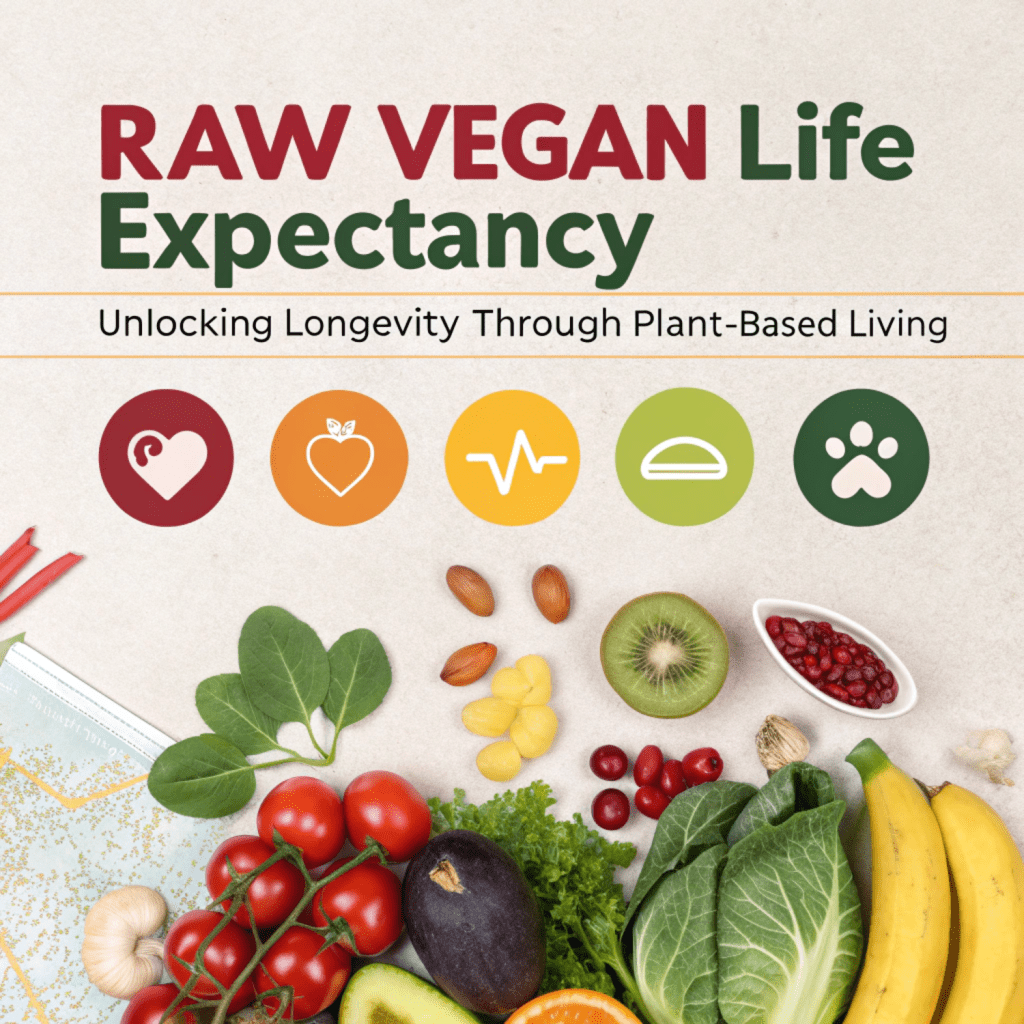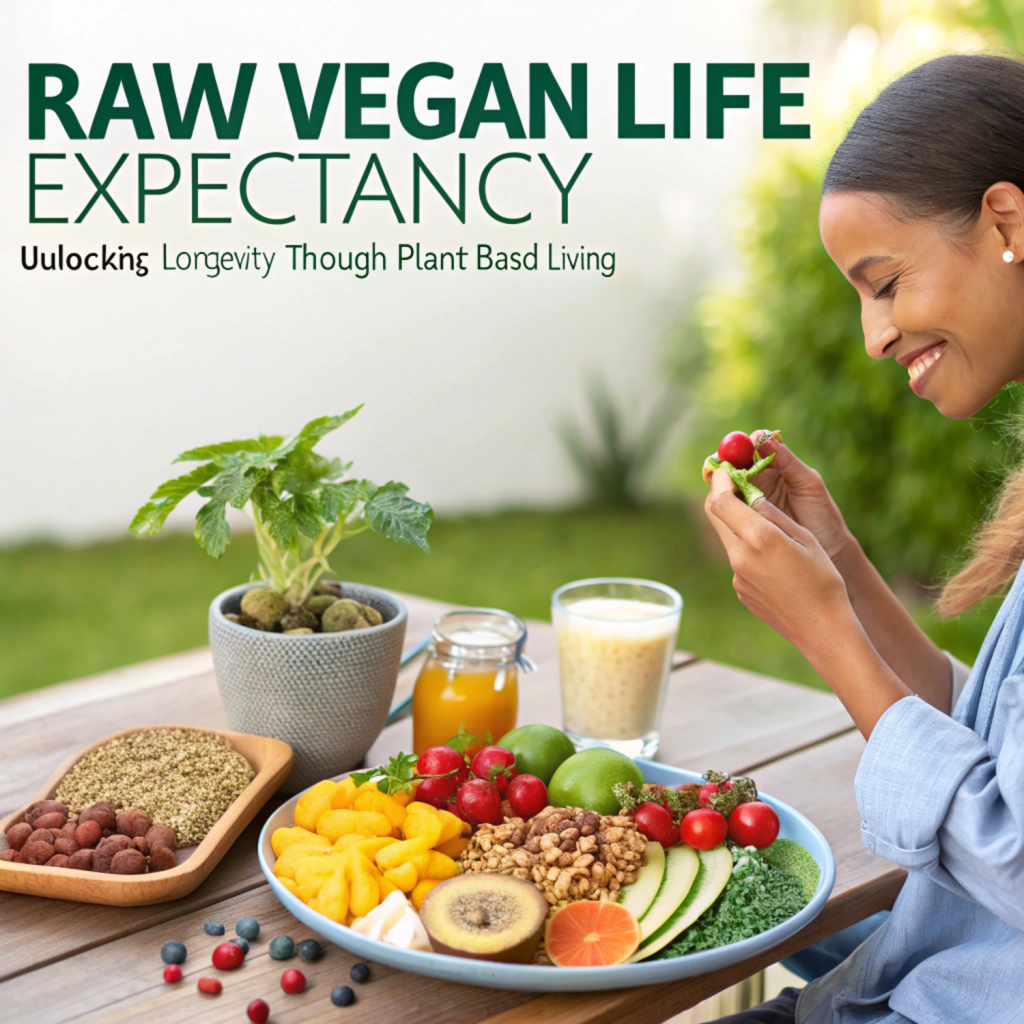
Raw vegan life expectancy captivates health enthusiasts, researchers, and those seeking a vibrant, long life. This dietary approach, centered on uncooked, unprocessed plant foods, promises numerous health benefits. But does it truly extend life? This article explores the raw vegan lifestyle, its origins, how to adopt it, its nutritional profile, and its potential impact on longevity.
What Is a Raw Vegan Diet?
A raw vegan diet consists of plant-based foods consumed in their natural, unprocessed state, typically not heated above 118°F (48°C). Followers eat fruits, vegetables, nuts, seeds, sprouted grains, and legumes. The philosophy emphasizes preserving the natural enzymes and nutrients in food, which proponents believe enhances health and vitality.
This diet excludes all animal products, including meat, dairy, eggs, and honey, as well as cooked or processed foods. Raw vegans prioritize organic, whole foods to maximize nutritional intake and avoid synthetic additives.
Origins of the Raw Vegan Diet
The raw vegan movement traces back to the early 20th century, though its roots lie in ancient practices. Hippocrates, the father of modern medicine, advocated raw, plant-based foods for healing. In the 1800s, Dr. Maximilian Bircher-Benner, a Swiss physician, promoted raw diets after curing his own jaundice with raw apples.
The modern raw vegan movement gained traction in the 1970s with pioneers like Ann Wigmore, who founded the Hippocrates Health Institute. Wigmore popularized wheatgrass juice and living foods, emphasizing their role in detoxification and disease prevention. By the 1990s, raw veganism spread globally, fueled by books, retreats, and celebrity endorsements.
Today, raw veganism thrives as a lifestyle choice, with communities sharing recipes, hosting festivals, and advocating its benefits for health and the environment.
How to Adopt a Raw Vegan Lifestyle
Transitioning to a raw vegan diet requires planning and commitment. Here’s a step-by-step guide to get started:
1. Educate Yourself
Learn about raw vegan principles. Read books like The 80/10/10 Diet by Dr. Douglas Graham or Becoming Raw by Brenda Davis and Vesanto Melina. Understand which foods qualify as raw and vegan.
2. Stock Your Kitchen
Invest in tools like a high-powered blender, food processor, dehydrator, and spiralizer. These help create smoothies, nut milks, raw soups, and vegetable noodles. Stock up on fresh produce, nuts, seeds, and superfoods like chia, hemp, and cacao.
3. Start Gradually
Ease into the diet by incorporating more raw meals. Replace cooked breakfasts with green smoothies or fruit bowls. Add large salads to lunches and dinners. Over time, increase the proportion of raw foods.
4. Plan Balanced Meals
Ensure variety to meet nutritional needs. Combine fruits for energy, leafy greens for minerals, and nuts or seeds for healthy fats. Experiment with recipes like raw zucchini lasagna or avocado chocolate mousse.
5. Join a Community
Connect with raw vegan groups online or locally. Platforms like Meetup or Instagram offer recipe ideas and support. Attend raw food workshops or festivals to stay motivated.
6. Listen to Your Body
Monitor how you feel. If energy levels drop or cravings arise, adjust your intake. Consult a nutritionist to ensure you’re meeting nutrient requirements.

Nutritional Values of a Raw Vegan Diet
A raw vegan diet offers a wealth of nutrients but requires careful planning to avoid deficiencies. Here’s a breakdown of its nutritional profile:
Macronutrients
- Carbohydrates: Fruits and vegetables provide abundant carbs for energy. Bananas, dates, and mangoes are calorie-dense staples.
- Proteins: Sprouted legumes, nuts, seeds, and leafy greens supply protein. Hemp seeds and spirulina are excellent sources.
- Fats: Avocados, nuts, seeds, and coconut offer healthy fats. These support brain health and hormone production.
Micronutrients
- Vitamins: Raw fruits and vegetables are rich in vitamins A, C, E, and K. Citrus fruits boost immunity, while leafy greens support blood health.
- Minerals: Kale, spinach, and almonds provide calcium, magnesium, and potassium. Sea vegetables like nori offer iodine.
- Antioxidants: Berries, pomegranates, and raw cacao combat oxidative stress, reducing inflammation and aging.
Potential Deficiencies
While nutrient-dense, raw vegan diets can lack certain nutrients:
- Vitamin B12: Found primarily in animal products, B12 is critical for nerve function. Supplement with fortified foods or pills.
- Vitamin D: Sun exposure helps, but supplements may be needed, especially in winter.
- Omega-3 Fatty Acids: Flaxseeds and chia seeds provide ALA, but conversion to DHA/EPA is limited. Consider algae-based supplements.
- Iron: Plant-based iron (non-heme) is less absorbable. Pair iron-rich foods like spinach with vitamin C sources to enhance absorption.
- Calcium: Ensure adequate intake from greens, almonds, or fortified nut milks.
A 2019 study in Nutrients found that raw vegans had higher intakes of fiber, vitamins C and E, and magnesium but lower levels of B12 and protein compared to omnivores. Regular blood tests and supplementation address these gaps.
Raw Vegan Life Expectancy: Does It Extend Life?
The link between raw vegan life expectancy and longevity sparks debate. No large-scale, long-term studies directly confirm that raw veganism extends life. However, evidence suggests potential benefits:
Supporting Evidence
- Lower Disease Risk: Raw vegan diets are high in fiber, antioxidants, and phytonutrients, which reduce risks of heart disease, diabetes, and certain cancers. A 2020 American Journal of Clinical Nutrition study linked plant-based diets to a 25% lower risk of cardiovascular disease.
- Anti-Aging Benefits: Antioxidants in raw foods combat free radicals, slowing cellular aging. A 2017 study in Aging Cell found that high fruit and vegetable intake correlates with longer telomeres, markers of cellular longevity.
- Weight Management: Raw vegan diets are typically low in calories and high in fiber, promoting healthy weight. A 2015 Nutrition Journal study showed raw vegan participants had lower BMI and better cholesterol levels.
- Gut Health: High fiber supports a diverse gut microbiome, linked to longevity in a 2021 Nature Aging study.
Challenges and Risks
- Nutrient Deficiencies: Without proper planning, deficiencies in B12, iron, or omega-3s can harm health, potentially shortening life expectancy.
- Caloric Insufficiency: Low-calorie intake may lead to fatigue or muscle loss if not balanced with calorie-dense foods like nuts or avocados.
- Social and Practical Barriers: The restrictive nature of raw veganism can lead to social isolation or difficulty sustaining the diet, impacting mental health.
Anecdotal Claims
Raw vegan advocates like Dr. Gabriel Cousens claim followers live longer, citing cases of centenarians on plant-based diets. However, these claims lack rigorous scientific backing. Lifestyle factors like exercise, stress management, and genetics also heavily influence longevity.
Health Benefits Beyond Longevity
Adopting a raw vegan diet offers benefits that indirectly support a longer, healthier life:
- Improved Digestion: High enzyme content in raw foods aids digestion, reducing bloating and improving nutrient absorption.
- Enhanced Energy: Nutrient-dense foods provide sustained energy, as reported by 68% of raw vegans in a 2018 Journal of Nutrition survey.
- Clearer Skin: Antioxidants and hydration from raw foods promote radiant skin, reducing acne and signs of aging.
- Environmental Impact: Raw veganism reduces carbon footprints, aligning with sustainable living, which supports mental well-being.
Sample Raw Vegan Meal Plan
To illustrate the diet’s practicality, here’s a one-day meal plan:
- Breakfast: Green smoothie (spinach, banana, mango, chia seeds, almond milk)
- Snack: Apple slices with raw almond butter
- Lunch: Raw zucchini noodles with cashew Alfredo sauce and cherry tomatoes
- Snack: Raw energy balls (dates, walnuts, coconut)
- Dinner: Large salad (kale, avocado, cucumber, sprouts, lemon-tahini dressing)
- Dessert: Raw cacao mousse (avocado, cacao powder, maple syrup)
This plan balances macronutrients and provides variety, keeping meals vibrant and satisfying.
Common Myths About Raw Veganism
Myth 1: Raw Vegan Diets Lack Protein
Fact: Sprouted grains, nuts, seeds, and greens provide sufficient protein. A 70kg person needs about 56g of protein daily, achievable with 1 cup of sprouted lentils (15g) and 2 tbsp of hemp seeds (10g).
Myth 2: Cooking Destroys All Nutrients
Fact: Cooking can reduce some nutrients (like vitamin C) but enhances others, like lycopene in tomatoes. Raw diets preserve enzymes, but the body produces its own digestive enzymes.
Myth 3: Raw Veganism Guarantees Longevity
Fact: While beneficial, longevity depends on genetics, lifestyle, and overall diet quality. Raw veganism is one piece of the puzzle.
Tips for Sustaining a Raw Vegan Lifestyle
- Batch Prep: Prepare large quantities of nut milks or dressings to save time.
- Seasonal Eating: Choose seasonal produce for freshness and affordability.
- Supplement Wisely: Take B12 and consider vitamin D or omega-3 supplements.
- Stay Hydrated: Drink plenty of water and include hydrating foods like cucumber and watermelon.
- Experiment with Flavors: Use herbs, spices, and citrus to keep meals exciting.
Who Should Avoid Raw Veganism?
Certain groups may struggle with raw veganism:
- Pregnant Women: Higher nutrient needs may be hard to meet without supplementation.
- Children: Growing bodies require consistent calories and nutrients, which can be challenging on a raw diet.
- Athletes: High-energy demands may necessitate more calorie-dense cooked foods.
- Those with Digestive Issues: High fiber can exacerbate conditions like IBS without proper adaptation.
Consult a healthcare provider before starting, especially if you have medical conditions.
Raw Vegan Life Expectancy: The Verdict
Raw vegan life expectancy remains a topic of intrigue. While no definitive studies prove it extends life, its high nutrient density, low processed food content, and disease-preventive properties suggest potential longevity benefits. Success hinges on careful planning to avoid deficiencies and maintain balance.
By embracing raw veganism, you invest in vibrant health, environmental sustainability, and a deeper connection to natural foods. Whether you go fully raw or incorporate more raw meals, the journey can transform your well-being. Start small, experiment, and discover how raw vegan living aligns with your health goals.

